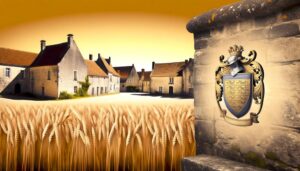Scott Name Origin and Meaning
The surname 'Scott' originates from the Old English term 'Scotti,' used to describe Gaelic-speaking inhabitants of Ireland and Scotland. It has evolved through Latin ('Scottus') and Middle English ('Scotte') to denote individuals from Scotland.
Historically significant, it appears in 12th-century charters and legal documents, reflective of the socio-political landscape. The name's spread beyond Scotland highlights economic opportunities and migrations.
Culturally, it is linked to notable figures like Sir Walter Scott. Variations such as Scot and Skott demonstrate linguistic adaptations over time.
Its enduring popularity underscores deep historical roots and wide geographic dispersion. To explore further, one can trace its detailed evolution and cultural impact.

Key Takeaways
- The surname 'Scott' originates from the Old English term 'Scotti,' referring to Gaelic-speaking inhabitants of Ireland and Scotland.
- It evolved from Latin 'Scottus,' denoting individuals from Scotland, reflecting geographical and cultural identity.
- Historically used since the 12th century, the Scott surname appears in royal charters and legal documents.
- The surname transitioned from an ethnic designation to a personal surname over time.
- Variations like Scot, Skott, and Scoot show changes in spelling and pronunciation reflecting linguistic shifts.
Etymology of Scott
The etymology of the surname 'Scott' traces its roots to the Old English term 'Scotti,' which was a reference to the Gaelic-speaking inhabitants of Ireland and Scotland.
Stemming from the Latin 'Scottus,' the term was historically used to denote individuals from the region now known as Scotland.
The surname encapsulates a geographical and cultural identity, reflecting the migratory patterns and linguistic influences of early medieval periods.
Scholars have noted that the name 'Scott' signifies not only ethnic affiliation but also social status, as it was often used to distinguish the Gaelic-speaking population from other groups.
Therefore, the surname 'Scott' offers a fascinating glimpse into the complex tapestry of historical, linguistic, and cultural interactions that shaped early British and Irish societies.
Early Historical Use
The early historical use of the surname Scott can be traced back to medieval Scottish records, where it was prominently prevalent among the border clans. This period saw the surname's geographic spread across various regions in Scotland and northern England.
Concurrently, the etymological evolution of the name reflected linguistic influences and regional variations that shaped its current form.
Medieval Scottish Records
In examining medieval Scottish records, one discovers that the surname Scott appears as early as the 12th century, reflecting its deep historical roots and significance. The earliest documented instances of the Scott surname can be traced to charters and legal documents that provide invaluable insights into its lineage. These records elucidate the socio-political landscape of medieval Scotland where the Scott family held notable positions.
| Year | Document Type |
|---|---|
| 1136 | Royal Charter |
| 1178 | Land Grant |
| 1190 | Feudal Record |
| 1203 | Legal Decree |
| 1221 | Church Register |
Such documents not only confirm the early use of the Scott surname but also underscore its prominence in medieval society, marking the family as influential figures within the Scottish historical narrative.
Surname's Geographic Spread
Documentation from the early historical period reveals a discernible geographic spread of the Scott surname, indicating its proliferation beyond the central regions of Scotland. This diffusion can be traced through various medieval records, reflecting migrations and socio-political movements.
By the 12th century, the Scott surname appeared in regions such as Northumberland and Yorkshire, suggesting cross-border interactions. The spread was likely facilitated by economic opportunities and feudal ties, as families bearing the surname sought land and alliances.
Additionally, the surname's presence in early English registers illustrates its integration into the broader Anglo-Norman societal structure. These records collectively underscore the expansive reach of the Scott surname, demonstrating its establishment as a recognizable identifier across multiple regions.
Etymological Evolution
Examining the etymological evolution of the Scott surname reveals insights into its early historical use and linguistic transformations. Originating from the Old English term 'Scottas,' referencing the Gaelic-speaking residents of Ireland and Scotland, the name evolved substantially over centuries. The term 'Scott' initially described a person's ethnic origin or regional affiliation rather than serving as a familial identifier.
| Term | Language | Meaning |
|---|---|---|
| Scottas | Old English | Gaelic-speaking residents |
| Scotti | Latin | People from Scotland or Ireland |
| Scotte | Middle English | Inhabitants of Scotland |
The shift from 'Scottas' to 'Scott' illustrates a change from a collective ethnic designation to a personal surname, reflecting broader societal changes in identity and nomenclature practices during the medieval era.
Scott in Scotland
The surname Scott, primarily associated with Scottish heritage, signifies a deep-rooted connection to the country's cultural and historical identity. Originating from the Old English term 'Scotti,' meaning a person from Scotland, the name embodies the essence of Scottish lineage.
Within Scotland, the surname has been prevalent since the medieval period, often linked to notable clans and historical figures.
Clans and Nobility: The Scott clan, particularly influential in the Border regions, played a significant role in Scottish history.
Historical Records: Documentation of the surname Scott dates back to the 12th century, indicating its longstanding presence.
Cultural Influence: The name Scott is intertwined with Scotland's literary and cultural development, exemplified by figures such as Sir Walter Scott.
This rich historical backdrop underscores the surname's prominence within Scotland.
Migration and Spread
As the surname Scott established deep roots within Scotland, it gradually began to migrate beyond its borders, spreading to various regions and countries. This dispersion was propelled by various historical events such as the Highland Clearances and economic opportunities abroad. The migration led to the establishment of Scott families in regions like North America, Australia, and New Zealand, where they integrated into local cultures while retaining their distinct heritage.
| Region | Period of Significant Migration |
|---|---|
| North America | 18th to 19th centuries |
| Australia | 19th century |
| New Zealand | Late 19th to early 20th century |
The global spread of the Scott surname illustrates not only the mobility of Scottish families but also their adaptability and influence in diverse societies.
Famous People Named Scott
The prominence of individuals bearing the name Scott has been remarkable across various historical and cultural contexts. Influential figures such as Sir Walter Scott have made significant contributions to literature, while contemporary celebrities like director Ridley Scott have left indelible marks on the film industry.
Analyzing these remarkable Scotts provides insight into the widespread impact and enduring legacy of the name.
Influential Scotts in History
Numerous individuals named Scott have left indelible marks on history through their contributions to various fields such as literature, politics, and science. These influential figures have shaped their respective domains, often achieving remarkable feats.
For example, Sir Walter Scott, a seminal figure in literature, was instrumental in the development of the historical novel.
In the field of politics, Scott Morrison has held significant sway as the Prime Minister of Australia.
To conclude, in the scientific community, Scott Carpenter stood out as an astronaut and aquanaut, contributing notably to space exploration and undersea research.
- Sir Walter Scott: Pioneer of the historical novel.
- Scott Morrison: Impactful Australian Prime Minister.
- Scott Carpenter: Renowned astronaut and aquanaut.
These individuals exemplify the diverse arenas in which people named Scott have excelled.
Celebrities Named Scott
Renowned across various entertainment industries, numerous celebrities named Scott have garnered significant acclaim for their talents and contributions. Among them, Scott Fitzgerald, acclaimed author of 'The Great Gatsby,' stands as a literary titan whose works have profoundly influenced American literature.
In the world of film, Ridley Scott, a visionary director, has crafted iconic movies such as 'Blade Runner' and 'Gladiator,' earning critical and commercial success. Additionally, Scott Eastwood, an accomplished actor, has made notable strides in Hollywood, following in the footsteps of his father, Clint Eastwood.
Moreover, Scott Joplin, a legendary composer and pianist, revolutionized music with his pioneering ragtime compositions. Collectively, these individuals exemplify the diverse and impactful legacy of the name Scott in contemporary culture.
Cultural Significance
Scott, as a surname, holds substantial cultural importance across various regions and historical periods. Originating from the Old English term 'Scotti,' it denotes a person from Scotland or an individual associated with the Gaelic culture. Its prominence is underscored by historical figures and societal contexts.
Sir Walter Scott, a pivotal literary figure, profoundly shaped 19th-century literature.
The surname is linked to the Border Reivers, families renowned for their influence along the Anglo-Scottish border during the late medieval period.
In contemporary society, the surname Scott is prevalent, often seen in politics, entertainment, and business sectors.
The cultural resonance of the surname Scott underscores its enduring legacy and multifaceted impact.
Variations and Derivatives
The surname Scott has evolved into various forms and derivatives, reflecting linguistic shifts and regional adaptations over time. These variations often arise from phonetic spellings, regional dialects, and migrations. Significantly, surnames like Scot, Skott, and Scoot illustrate minor yet noteworthy changes in spelling and pronunciation. Additionally, derivatives such as Scotton and Scotter denote geographic origins or occupational affiliations tied to the original name.
| Variation | Region of Origin |
|---|---|
| Scot | Scotland |
| Skott | Scandinavia |
| Scoot | England |
| Scotton | England |
These adaptations underscore the dynamic nature of surnames and their capacity to encapsulate historical and cultural transformations. Each variant offers a unique lens through which to examine the surname's rich and multifaceted history.
Modern Popularity
In contemporary times, the surname Scott maintains significant prevalence across various regions, reflecting both its historical roots and ongoing cultural relevance. The name's enduring popularity can be attributed to several factors:
- Geographical Dispersion: The surname is widely found in English-speaking countries, particularly in the United States, the United Kingdom, Canada, and Australia.
- Cultural Significance: The name is associated with numerous influential figures in literature, politics, and entertainment, enhancing its visibility.
- Demographic Data: According to recent census data, the surname ranks consistently high in terms of frequency, indicating its widespread use.
This sustained prominence underscores the dynamic nature of surnames as cultural markers, evolving yet retaining a connection to their origins.
Conclusion
The name Scott, rooted in ancient etymology, exhibits a rich historical tapestry. Its early use traces back to Scotland, reflecting a significant cultural heritage.
The migration and widespread adoption of the name have led to its global recognition. Notable individuals bearing the name have further cemented its prominence.
Cultural resonance, variations, and modern popularity underscore its enduring appeal. Therefore, Scott remains a name of historical depth, cultural significance, and contemporary relevance.






